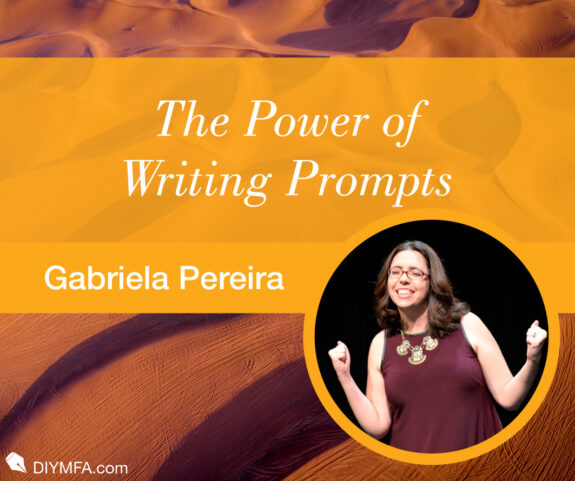As a New Year’s resolution in January of 2007, I decided I was a writer and would start acting like one. No more excuses. I was going to stop complaining and saying that I’d start writing “someday.” I would glue my backside to the chair and start writing right now. The problem was, I had no idea where to start. Then I stumbled on a system of doing writing prompts that built up my stamina and got me tangible results. This system is what I now call the Writer Igniter Method.
The Writer Igniter Method boils down to one simple concept: writing comes from practice, and the best way to develop your skills is by doing the work and getting those words on the page. The key to the method is using prompts or exercises to guide your writing. When I first began using prompts, I had no system. Instead, I chose exercises at random from the books in my writer’s library.
At first, I would work my way through prompt books one at a time, forcing myself to write something for each and every exercise, even if the result was terrible. Before I knew it, I had produced several short stories (some of which eventually got published), I had put together a writing sample that helped me get accepted into an MFA program, and I even completed my first finished draft of a novel. All because of a few writing prompts.
Writing prompts are not for everyone. Sure, some writers love them and sit in class, pencils poised, waiting for the teacher to give an assignment. These are the same writers who love the sound of their own writing. Their hands shoot into the air as soon as the exercise is over, lest the teacher overlook them and not let them share what they wrote.
Other writers—mere mortals (like myself), who do not have the muse on speed dial—are not as enthusiastic about writing exercises. To them, prompts are the writing equivalent of eating your vegetables: not fun but good for you. Just like the veggies that fill you up and leave no room for dessert, prompts take up time that could be used to write something that matters. Something epic and important, like that book of your dreams. Prompts might be about as appealing to you as soggy brussels sprouts but they do serve a purpose. Here are seven good reasons you should use prompts in your writing.
Lower stakes means higher output.
When we work on a project that we care about, the stakes are high. We want to produce something worthy of this amazing idea, so we put all sorts of pressure on ourselves. This kind of pressure can actually decrease our ability to write, sometimes leading to full-blown writer’s block. Instead, if we warm up with an exercise, there’s little pressure and mistakes are expected so we’re less likely to get performance anxiety.
Prompts are like the writing equivalent of a musician practicing their scales or an actor doing vocalization exercises. You would never do this on stage in a performance, but it helps you loosen up and get ready to perform.
Prompts can boost your confidence.
Most of the time when you write from a prompt, you go into it knowing that the writing will be awful. Once you reread what you wrote, you may discover a handful of gems buried in the garble. Suddenly your writing isn’t quite as hopeless as you thought. If you go into a writing session expecting the result to be truly horrible, then it’s a pleasant surprise when what you get is not so bad. Writing prompts can help you learn to set those first-draft expectations extra-low.
Less attachment means more room for improvement.
Prompts are usually “throw-away” writing. You’re just warming up; you’re not writing for real. This means that what you produce is not going to be as dear to your heart as that turn of phrase in your work-in-progress that you agonized over for the last two hours. The more darling something is to you, the harder it will be for you to kill, if necessary. On the other hand, if you’re revising something you just tossed on the page during a ten-minute exercise, you’ll be much more open to making broad, sweeping changes. Who cares if you have to rewrite it? It’s just an exercise.
You will learn to think “on the fly.”
Want to learn how to write on demand? Here’s a secret no one tells you: creativity has nothing to do with being a “creative person,” it’s all about practice. Forget being inspired by the muse. If you want to be creative, you have to build discipline through practice. The more you train your brain to produce ideas and throw them on the page, the better at it you will get. One of the best ways to build up your writing practice is by doing prompts.
You can hone your craft.
Is there a particular writing technique that has you stumped? Rather than trying to learn it as you work on your novel, do a practice run (or two, or ten) using writing prompts. Is point of view confusing? Write the same prompt using different points of view until you get it straight. Need practice writing dialogue? Choose a couple of prompts and write all of them with nothing but dialogue. Use a prompt as a low-pressure testing ground, where you can try out techniques without fear of failure. This will allow you to hone your craft without the risk of breaking your book in the process.
It can be fun to try something wild.
Prompts are a great way to get the sillies out of your system. You can use prompts as a forum for trying ideas that might seem out of place in your work-in-progress. I’ve done this many times with my own characters, letting them go wild in a writing prompt, then dialing it back and channeling that prompt into something I can actually use in my novel or short story. Use prompts to try ideas on for size or to let your characters do something that might seem completely out-of-character.
Use prompts to write freely and see where it leads. In the end, you’ll probably find something of value buried amid the silliness and you’ll be able to extract it and mold it into something that you can use. This is a great way to test your characters’ boundaries and see how far you can push them until they break, and it can be less intimidating to try something wild in the low-pressure environment of an exercise than to try it in your novel or story.
Think on paper instead of in your head.
The other day I was scribbling in my notebook when someone asked me what I was writing. I replied with: “I’m not writing, I’m thinking.” Thinking on paper can be far more effective than thinking in your head. For starters, thinking on paper engages more senses: you see the words and doodles on the page, feel your hand holding the pen and forming the words, even hear the words in your mind as you write them.
Why is sensory input important? First, associating these sensory stimuli with writing will help you be more productive and make you better able to get creative on demand. Also the more senses you use to process your ideas, the more likely you will be to come up with creative new ideas or solutions. By engaging as many senses as possible in your creative process, you can increase your creative output. Thinking on paper is a great way to do this.
And guess what? Writing prompts are a great way to learn how to think on paper.
Writer Igniter App
Writing prompts are a great way to build a regular writing practice. If you’re looking for some exercises to help you get that writing practice going, we have a resource at DIY MFA that can help. Go to WriterIgniter.com and click the “shuffle” button on the web app for a nearly endless supply of prompts and story ideas.
Until next time, keep writing and keep being awesome!

P.S. For more info on Gabriela Pereira, the founder and instigator of DIY MFA, check out her profile page.







